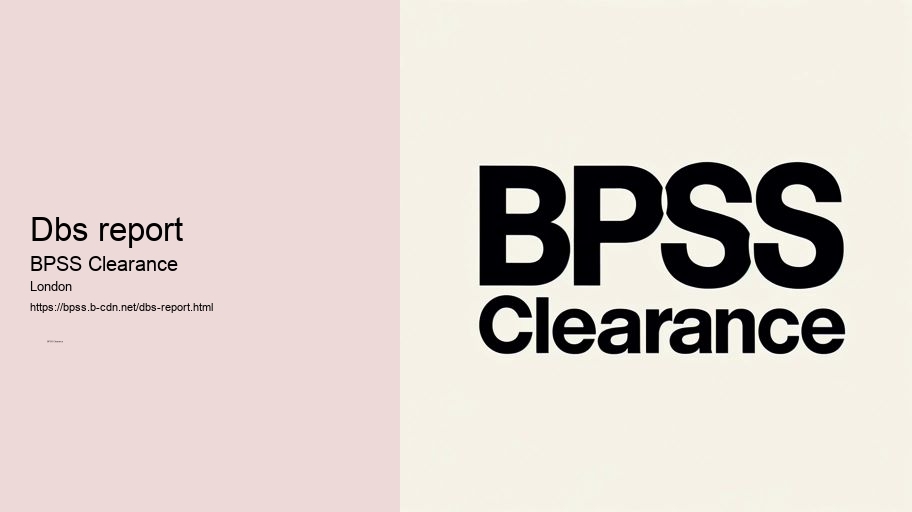
The process of obtaining BPSS clearance includes a detailed review of the applicant's identity documents, such as passports or driver's licenses. This step is vital to confirm that the individual is who they claim to be, which is fundamental in preventing identity fraud within high-security environments. Proper identification is the cornerstone of the BPSS clearance process and helps maintain the integrity of the workforce within protected sectors.
- Providing reasons for extended stays abroad can help clarify your activities during that time.
A crucial part of the BPSS clearance is the criminal record check, which helps identify any unspent convictions the applicant may have.
The identity verification process is a crucial part of BPSS checks. It requires individuals to provide valid, government-issued identification documents, such as a passport or driver’s license. National security This step ensures that the candidate is who they claim to be and helps prevent identity fraud.
Generally, a BPSS check can take anywhere from two weeks to a month to complete. This timeframe assumes that there are no complications, such as discrepancies in the information provided or delays in receiving necessary documents from third parties.
- Any connections or affiliations established overseas should be clearly communicated.

Several factors can influence the duration of a BPSS check. These include the accuracy of the information provided by the applicant, the speed with which previous employers respond to verification requests, and the specific requirements of the employing organization.
Individuals applying for National Security Vetting (NSV) must undergo a BPSS check as a prerequisite. Roles in sectors such as energy, communications, and finance necessitate BPSS clearance to guarantee the protection of sensitive information.
The timeline for conducting these checks also differs. BPSS checks are generally quicker to complete, often within a few weeks, reflecting their role as a baseline security measure. BS7858:2019 checks, due to their more detailed nature, can take significantly longer — up to 12 weeks or more — as they require gathering more comprehensive information and thorough verification processes from multiple sources.
Can You Fail a Bpss? Yes, you can fail a BPSS check if there are discrepancies in your identity verification, right to work status, criminal records, or employment history. It's essential to provide accurate information and meet the trustworthiness standards to pass the screening process. Failing to do so can result in not meeting the required eligibility criteria for accessing sensitive information and working in secure environments. Be honest and consistent to avoid failing the BPSS check.
Lastly, education professionals, particularly those in positions of trust and responsibility such as headteachers or senior administrators, often need BPSS clearance. They work in environments with young and vulnerable individuals and must ensure a safe and secure educational setting.
- Highlight any security-sensitive activities or exposures encountered while abroad.

Who Needs a BPSS Check, Confirming the need for a BPSS check involves identifying specific roles and sectors where clearance is mandatory to safeguard sensitive information and establish trustworthiness.
BPSS is essential for roles accessing sensitive government assets, whereas DBS is commonly used in sectors like healthcare and education. Employers often require both checks to thoroughly screen candidates, ensuring safety and trust in their workforce.
For compliance, it is vital that employers keep records of the documents checked as part of the right to work process. These records must be stored securely and retained for the duration of the employee's employment and for two years afterwards, as stipulated by the Home Office. This documentation can be critical in proving that the employer has diligently followed legal requirements should their compliance ever be questioned.
BPSS checks are governed by standards set by the UK government, specifically designed to comply with national security guidelines for personnel working in secure environments. The implementation of BPSS checks ensures that individuals have the right to work in the UK and do not have affiliations or histories that could pose a security risk.
Under the Immigration, Asylum, and Nationality Act 2006, employers are required to perform right to work checks to confirm an individual's eligibility to work in the UK.
4. **AI Integration:** The integration of artificial intelligence and machine learning is likely to improve the effectiveness of BPSS checks, enhancing overall security measures.

BPSS clearance procedures also adhere to UK employment laws to ensure that the vetting process is non-discriminatory and respects the rights of individuals. Employers must ensure that their BPSS processes comply with the Equality Act 2010, avoiding any form of discrimination based on protected characteristics during the vetting process.
Moreover, digital technology supports ongoing monitoring and updating of BPSS clearances. Once an individual has been vetted, their information can be continuously checked against updated databases for any changes that might affect their security status, such as new criminal records or changes in financial status, ensuring ongoing compliance with security standards.
When aiming for BPSS clearance, ensuring you have the right documents is paramount. Your proof of identity, employment history, and national and immigration status play an essential role in this process. However, delving into the specifics of unspent criminal records and time spent abroad might hold the key to your successful clearance. Each document serves as a puzzle piece in the larger picture of your suitability. Remember, attention to detail in gathering these documents could be the difference-maker in your clearance journey.
